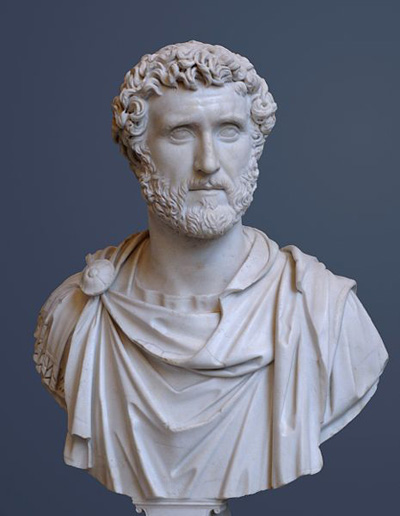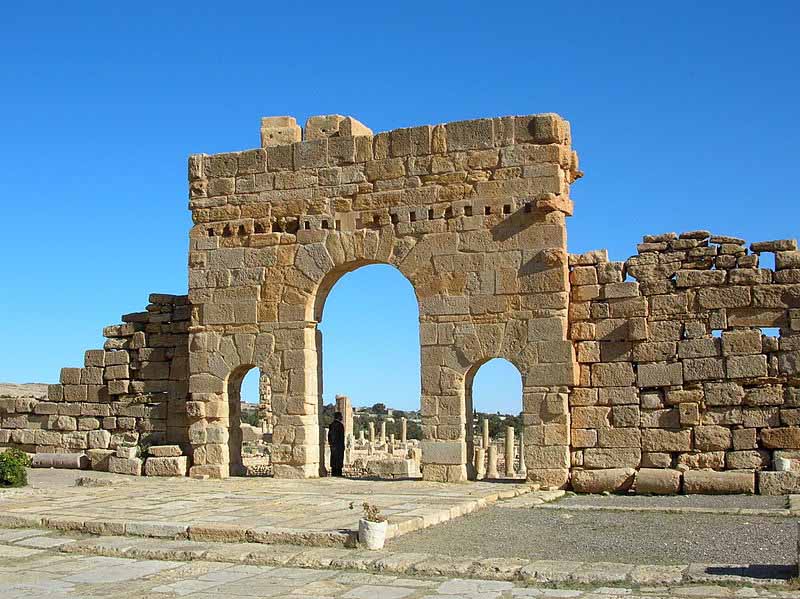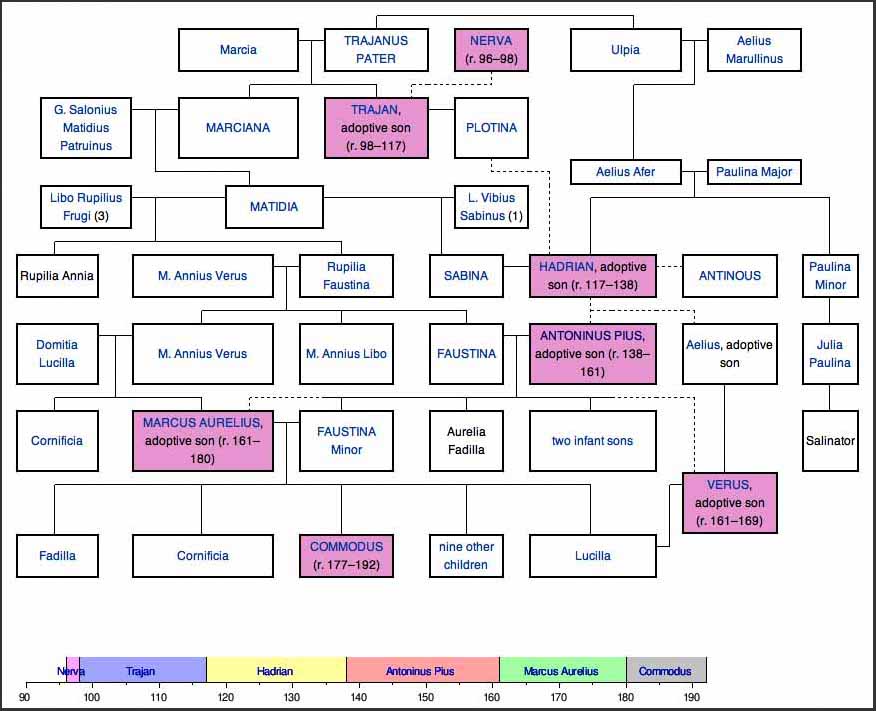


Arch of Antoninus Pius in Sbeitla, Tunisia
Antoninus Pius (September 19, 86 AD - March 7, 161 AD), also known as Antoninus, was Roman Emperor from 138 AD - 161AD. He was a member of the Nerva-Antonine dynasty and the Aurelii. He acquired the name Pius after his accession to the throne, either because he compelled the Senate to deify his adoptive father Hadrian, or because he had saved senators sentenced to death by Hadrian in his later years.
He was born as the only child of Titus Aurelius Fulvus, consul in 89 whose family came from Nemausus (modern N”mes). He was born near Lanuvium and his mother was Arria Fadilla. AntoninusŐ father and paternal grandfather died when he was young and he was raised by Gnaeus Arrius Antoninus, his maternal grandfather, reputed by contemporaries to be a man of integrity and culture and a friend of Pliny the Younger. His mother married Publius Julius Lupus (a man of consular rank) suffect consul in 98, and two daughters, Arria Lupula and Julia Fadilla, were born from that union.
Some time between 110 and 115, he married Annia Galeria Faustina the Elder. They are believed to have enjoyed a happy marriage. Faustina was the daughter of consul Marcus Annius Verus and Rupilia Faustina (a half-sister to Roman Empress Vibia Sabina). Faustina was a beautiful woman, well known for her wisdom. She spent her whole life caring for the poor and assisting the most disadvantaged Romans. Faustina bore Antoninus four children, two sons and two daughters.
When Faustina died in 141, Antoninus was greatly distressed. In honor of her memory, he asked the Senate to deify her as a goddess, and authorised the construction of a temple to be built in the Roman Forum in her name, with priestesses serving in her temple. He had various coins with her portrait struck in her honor. These coins were scripted ÔDIVAE FAUSTINAŐ and were elaborately decorated. He further created a charity which he founded and called it Puellae Faustinianae or Girls of Faustina, which assisted orphaned girls. Finally, Antoninus created a new alimenta.
Having filled the offices of quaestor and praetor with more than usual success, he obtained the consulship in 120; he was next appointed by the Emperor Hadrian as one of the four proconsuls to administer Italia, then greatly increased his reputation by his conduct as proconsul of Asia, probably during 134-135. He acquired much favor with the Emperor Hadrian, who adopted him as his son and successor on 25 February 138, after the death of his first adopted son Lucius Aelius, on the condition that Antoninus would in turn adopt Marcus Annius Verus, the son of his wife's brother, and Lucius, son of Aelius Verus, who afterwards became the emperors Marcus Aurelius and Lucius Verus.
On his accession, Antoninus' name became "Imperator Caesar Titus Aelius Hadrianus Antoninus Augustus Pontifex Maximus". One of his first acts as Emperor was to persuade the Senate to grant divine honors to Hadrian, which they had at first refused; his efforts to persuade the Senate to grant these honors is the most likely reason given for his title of Pius (dutiful in affection; compare pietas).
Two other reasons for this title are that he would support his aged father-in-law with his hand at Senate meetings, and that he had saved those men that Hadrian, during his period of ill-health, had condemned to death. He built temples, theaters, and mausoleums, promoted the arts and sciences, and bestowed honors and financial rewards upon the teachers of rhetoric and philosophy. Antoninus made few initial changes when he became emperor, leaving intact as far as possible the arrangements instituted by Hadrian.
There are no records of any military related acts in his time in which he participated. One modern scholar has written "It is almost certain not only that at no time in his life did he ever see, let alone command, a Roman army, but that, throughout the twenty-three years of his reign, he never went within five hundred miles of a legion". His reign was the most peaceful in the entire history of the Principate; while there were several military disturbances throughout the Empire in his time, in Mauretania, Iudaea, and amongst the Brigantes in Britannia, none of them are considered serious. It was however in Britain that Antoninus decided to follow a new, more aggressive path, with the appointment of a new governor in 139, Quintus Lollius Urbicus.
Under instructions from the emperor, he undertook an invasion of southern Scotland, winning some significant victories, and constructing the Antonine Wall from the Firth of Forth to the Firth of Clyde, although it was soon abandoned for reasons that are still not quite clear. There were also some troubles in Dacia Inferior which required the granting of additional powers to the procurator governor and the dispatchment of additional soldiers to the province. Also during his reign the governor of Upper Germany, probably Caius Popillius Carus Pedo, built new fortifications in the Agri Decumates, advancing the Limes Germanicus fifteen miles forward in his province and neighboring Raetia.
Nevertheless, Antoninus was virtually unique among emperors in that he dealt with these crises without leaving Italy once during his reign, but instead dealt with provincial matters of war and peace through their governors or through imperial letters to the cities such as Ephesus (of which some were publicly displayed). This style of government was highly praised by his contemporaries and by later generations.
Of the public transactions of this period there is only the scantiest of information, but, to judge by what is extant, those twenty-two years were not remarkably eventful in comparison to those before and after his reign. However, he did take a great interest in the revision and practice of the law throughout the empire. Although he was not an innovator, he would not follow the absolute letter of the law; rather he was driven by concerns over humanity and equality, and introduced into Roman law many important new principles based upon this notion.
In this, the emperor was assisted by five chief lawyers: L. Fulvius Aburnius Valens, an author of legal treatises; L. Volusius Maecianus, chosen to conduct the legal studies of Marcus Aurelius, and author of a large work on Fidei Commissa (Testamentary Trusts); L. Ulpius Marcellus, a prolific writer; and two others. His reign saw the appearance of the Institutes of Gaius, an elementary legal manual for beginners (see Gaius (jurist)).
Antoninus passed measures to facilitate the enfranchisement of slaves. In criminal law, Antoninus introduced the important principle that accused persons are not to be treated as guilty before trial. He also asserted the principle, that the trial was to be held, and the punishment inflicted, in the place where the crime had been committed. He mitigated the use of torture in examining slaves by certain limitations. Thus he prohibited the application of torture to children under fourteen years, though this rule had exceptions.
One highlight during his reign occurred in 148, with the nine-hundredth anniversary of the foundation of Rome being celebrated by the hosting of magnificent games in Rome. It lasted a number of days, and a host of exotic animals were killed, including elephants, giraffes, tigers, rhinoceroses, crocodiles and hippopotami. While this increased AntoninusŐs popularity, the frugal emperor had to debase the Roman currency. He decreased the silver purity of the denarius from 89% to 83.5% - the actual silver weight dropping from 2.88 grams to 2.68 grams.
Scholars place Antoninus Pius as the leading candidate for fulfilling the role as a friend of Rabbi Judah the Prince. According to the Talmud (Avodah Zarah 10a-b), Rabbi Judah was very wealthy and greatly revered in Rome. He had a close friendship with "Antoninus", possibly Antoninus Pius, who would consult Rabbi Judah on various worldly and spiritual matters.
After the longest reign since Augustus (surpassing Tiberius by a couple of months), Antoninus died of fever at Lorium in Etruria, about twelve miles (19 km) from Rome, on 7 March 161, giving the keynote to his life in the last word that he uttered when the tribune of the night-watch came to ask the password - "equanimitas" (equanimity). His body was placed in Hadrian's mausoleum, a column was dedicated to him on the Campus Martius, and the temple he had built in the Forum in 141 to his deified wife Faustina was rededicated to the deified Faustina and the deified Antoninus.
The only account of his life handed down to us is that of the Augustan History, an unreliable and mostly fabricated work. Nevertheless, it still contains information that is considered reasonably sound - for instance, it is the only source that mentions the erection of the Antonine Wall in Britain. Antoninus is unique among Roman emperors in that he has no other biographies. Historians have therefore turned to public records for what details we know.
Inevitably, the surviving evidence is not complete enough to determine whether one should interpret, with older scholars, that he wisely curtailed the activities of the Roman Empire to a careful minimum, or perhaps that he was uninterested in events away from Rome and Italy and his inaction contributed to the pressing troubles that faced not only Marcus Aurelius but also the emperors of the third century.
German historian Ernst Kornemann has had it in his Ršmische Geschichte [2 vols., ed. by H. Bengtson, Stuttgart 1954] that the reign of Antoninus comprised "a succession of grossly wasted opportunities," given the upheavals that were to come. There is more to this argument, given that the Parthians in the East were themselves soon to make no small amount of mischief after Antoninus' passing. Kornemann's brief is that Antoninus might have waged preventive wars to head off these outsiders.
Dotted lines indicate adoption or (in the case of Hadrian and Antinous) alleged lovers
